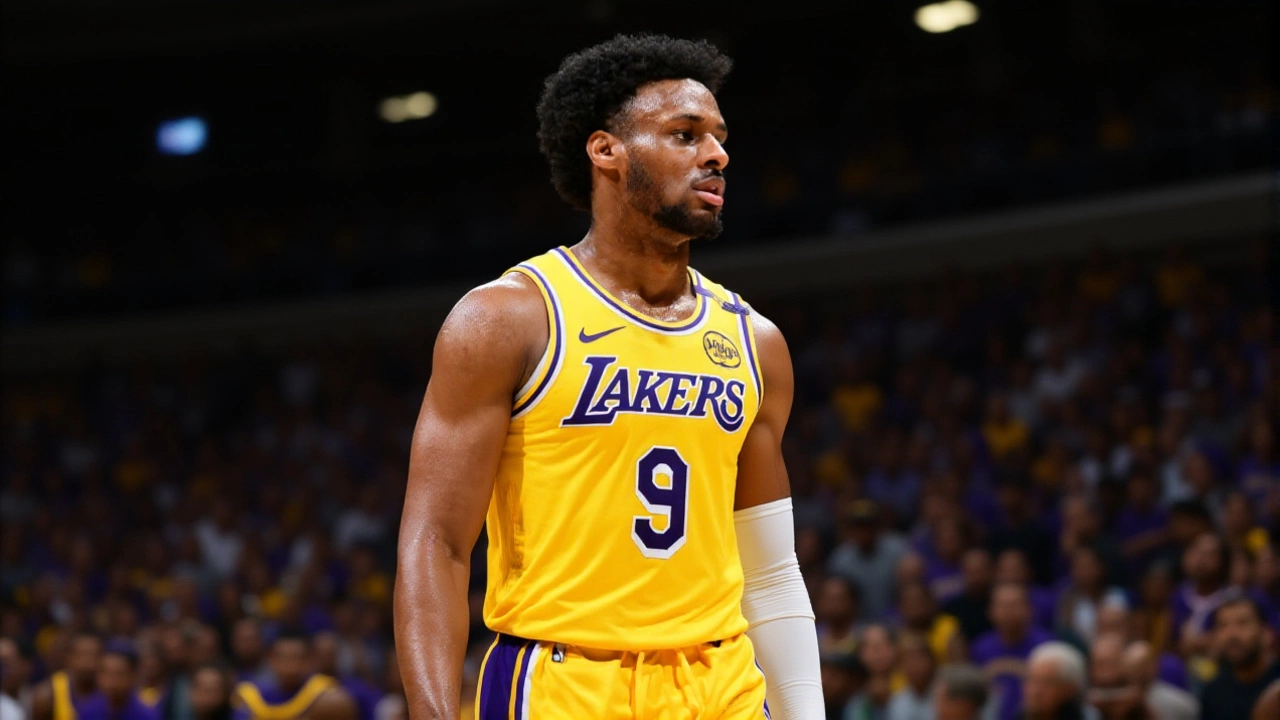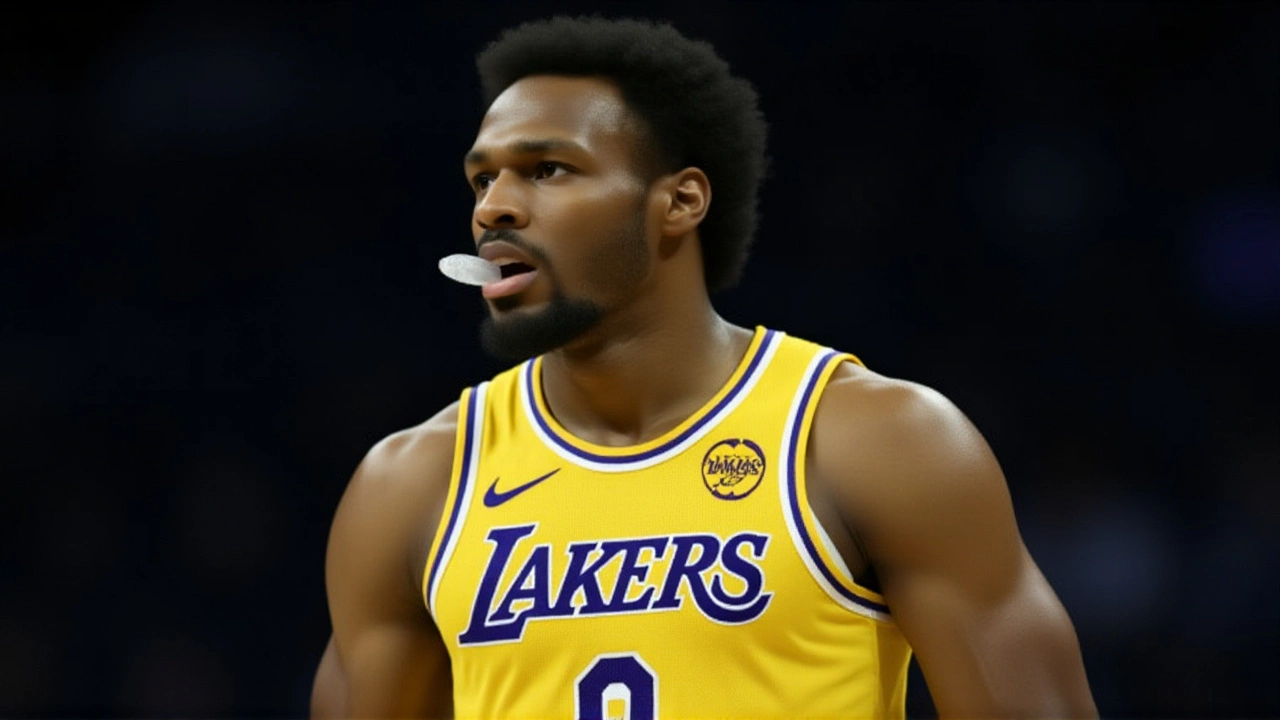When Bronny James took the court for his second career start on November 16, 2025, fans expected more than silence. Instead, the 21-year-old guard from Akron, Ohio, logged exactly 10 minutes — four in the first half, six in the second — and came away with zero points, zero rebounds, zero assists, and a 0-of-2 shooting line from deep. The Los Angeles Lakers won 119-95 over the Milwaukee Bucks at Fiserv Forum in Milwaukee, Wisconsin, but Bronny’s presence on the floor felt more like a footnote than a storyline. And that’s the problem.
Why Did Bronny Start? The Question No One Asked
The Lakers’ decision to start Bronny James wasn’t based on performance. It wasn’t even based on injury rotation — Luka Doncic and Austin Reaves were healthy. It wasn’t even about rest for veterans. The move came after ESPN reported Bronny had played just 12.1 minutes per game over his first eight appearances in the 2025-26 season, averaging 2.3 points and 1.9 assists. He was, by all metrics, a bench player. So why start him against a top-tier defense led by Giannis Antetokounmpo? The answer, as insiders suggest, is visibility. Legacy. The NBA’s most famous family, still in the spotlight, even when the game itself doesn’t demand it.The Numbers Don’t Lie — But They Don’t Tell the Whole Story
Bronny’s stat line was brutal: 0-of-2 from the field, both three-pointers, both contested by Milwaukee’s perimeter defenders who knew exactly where he’d go. He didn’t drive. He didn’t attack. He didn’t even look for the ball. In the first half, he was subbed out after four minutes — a move that drew no audible reaction from the crowd. By halftime, the Lakers were up 31 points. The game was already over. Yet Bronny stayed in for six more minutes in the second half, as if to give him a chance to redeem himself. He didn’t. His field goal percentage for the season? Still stuck at .313. His three-point percentage? .281. He’s made more free throws than field goals this season.Meanwhile, Luka Doncic dropped 41 points, nine rebounds, and six assists — a performance that could’ve been a MVP highlight reel. Austin Reaves added 25, and Deandre Ayton dominated inside with 20 points and 10 boards. The Lakers improved to 10-4. The Bucks fell to 5-9. But the only thing anyone talked about afterward? Bronny.
What’s the Real Goal Here? Legacy or Development?
This isn’t the first time Bronny’s been thrust into the spotlight for reasons beyond basketball. His first career start came in the final game of the 2024 season, when he played alongside his father, LeBron James, in a meaningless game against the Portland Trail Blazers. He scored four points, grabbed four rebounds, and had six assists — a moment that went viral, not because of its impact, but because of its symbolism. Now, in November 2025, the same pattern repeats. The Lakers aren’t playoff-bound yet — they’re good, but not elite. And Bronny? He’s not ready to be a starter. Not by the numbers. Not by his own play. But he’s the son of one of the greatest athletes of all time. And that matters.There’s a quiet tension here. On one side, the Lakers’ front office, led by Los Angeles Lakers president Rob Pelinka, must balance fan engagement, media pressure, and team chemistry. On the other, coaches like Darvin Ham are under pressure to win now — not nurture potential. Bronny’s minutes have been inconsistent all season. He’s played as little as 1.8 minutes per game in October. Now, he’s starting. The inconsistency isn’t random. It’s calculated.
The Ripple Effect: What This Means for Young Players
This isn’t just about Bronny. It’s about every young athlete watching. If you’re a 19-year-old prospect in the G League, and you see a player with a .313 field goal percentage start a game against a top-5 defense — simply because of his last name — what does that say about meritocracy in the NBA? It’s not that Bronny doesn’t have potential. He’s athletic. He’s coachable. He’s shown flashes of defensive awareness. But potential doesn’t equal readiness. And when teams prioritize symbolism over substance, it sends a message: talent can be outsourced.Compare this to the development path of Paolo Banchero in Orlando, or Victor Wembanyama in San Antonio. Both were given roles based on performance, not pedigree. They earned minutes. They earned trust. Bronny’s path is different. And that’s not necessarily wrong — it’s just different. But it’s not fair to the game.

What’s Next for Bronny James?
The Lakers play six games in the next 10 days — against the Warriors, Suns, and Jazz. Will he start again? Probably not. Will he play more than 10 minutes? Maybe. Will he ever be a consistent rotation player? That depends on whether he can develop a reliable mid-range game and stop hesitating on open looks. Right now, he’s a walking defensive mismatch. Opponents know he won’t shoot. And they’re not afraid to leave him.His father, LeBron, has said publicly that Bronny’s journey is his own. But in the NBA, no journey is truly private. Every missed shot is analyzed. Every minute logged is debated. And for a kid who turned 21 just weeks ago, that’s a heavy load to carry.
Historical Context: The James Legacy in the NBA
The Los Angeles Lakers, founded in 1947 and relocated to LA in 1960, have long been a stage for generational talent. Magic Johnson. Kobe Bryant. Shaquille O’Neal. Now, LeBron James — the franchise’s greatest player ever — is nearing the end of his career. And Bronny? He’s the first James to enter the league with a spotlight brighter than any rookie in history. His career stats — 27 games, 6.7 minutes per game, 2.3 points — are modest. But his cultural footprint? Massive.His first NBA appearance came in October 2024, when he played 2.3 minutes against the Jazz. He didn’t score. He didn’t matter. But 2.3 million people watched. That’s the reality. The game doesn’t need him to be a starter. But the brand does.
Frequently Asked Questions
Why did Bronny James start if he wasn’t playing well?
The Lakers started Bronny James not because of his performance, but because of his name and the media attention it brings. His 0-of-2 shooting and 10 minutes of play in a blowout win suggest this was a symbolic move, likely intended to generate buzz and reinforce the James family narrative — especially with LeBron nearing the end of his career. The team’s win was driven by Luka Doncic and Austin Reaves, not Bronny.
How does Bronny James’ playing time compare to other rookies?
Bronny’s 12.1 minutes per game this season is below average for a rookie on a playoff-contending team. For comparison, Paolo Banchero averaged 35 minutes per game as a rookie in 2022-23, and Victor Wembanyama played 32.4 minutes in his first season. Even bench players like Jalen Suggs (Orlando) and Trayce Jackson-Davis (Indiana) logged more consistent minutes than Bronny, despite having less name recognition.
What are Bronny James’ career stats so far?
As of November 2025, Bronny James has played 27 NBA games with one start. He averages 6.7 minutes per game, 2.3 points, 0.8 assists, and 0.7 rebounds. His field goal percentage is .313, three-point percentage is .281, and free throw percentage is .786. He’s never recorded a double-digit scoring game and has yet to make a field goal in his last three appearances.
Is Bronny James’ role a distraction for the Lakers?
Yes — but not in the way you might think. While teammates like Luka Doncic and Deandre Ayton have embraced their roles as primary scorers, the constant media focus on Bronny’s minutes and starts creates an unspoken tension. Coaches must manage locker room dynamics, and opponents are now adjusting their defensive schemes to exploit his presence. The distraction isn’t just external — it’s internal, affecting how the team is perceived.
What does LeBron James think about Bronny’s playing time?
LeBron has publicly stated he wants Bronny to earn his minutes and not rely on his name. But privately, sources say LeBron has pushed the Lakers’ front office to give Bronny more opportunities — even if it means playing him in low-leverage moments. The conflict is real: father wants his son to succeed, but the team needs to win now. That tension defines Bronny’s entire NBA journey.
Will Bronny James ever be a starter in the NBA?
If he improves his shooting consistency, develops a post-up game, and becomes a reliable defender, yes — but not with the Lakers. His current trajectory suggests he’s better suited for a team rebuilding around youth, where minutes aren’t tied to playoff pressure. A team like the Pistons, Spurs, or Jazz could give him the space to grow. The Lakers? They need winners, not projects.
